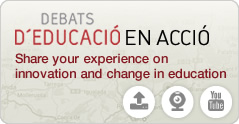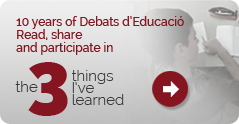You are here
Is educational performance unlimited?
About the speaker
Andreas Schleicher
Head of the Indicator Analysis Division and Director of Education with the Organisation for Economic Cooperation and Development (OECD)
This debate shows the experience in the field of compared assessment and evaluation of educational performance on an international scale within the framework of the PISA programme run by the OECD, which reveals the existence of significant differences in the quality, equality and efficiency of education systems. International comparisons are crucial when it comes to assessing progress in a world of fast-moving change, as the simple fact of improvement in a specific country is not sufficient if the rate of change is faster in another part of the world. PISA is the most complete assessment programme there is in terms of geographic and economic cover, even though the means of action used conceal huge variations and complex action templates. Many of the countries that have achieved high scores with PISA offer clearly drawn up educational objectives and standards, and at the same time there have been fewer regulations in terms of how teachers should translate these objectives into practice. In this sense, there are two key factors: transferring the decision-making capacity to schools, so transforming them into the principal driving force for educational development, and an intelligent responsibility. Countries with less stratified systems tend to achieve not only an above-average global action, but also significant improvements in the use of performance potential. We can see that there are two aspects that go hand in hand in the countries that produced the best results in the PISA international comparison: integrated learning opportunities and the ability of teachers to individualise education. International comparisons show that combining quality and equality is an aim which can be achieved within a reasonable length of time.
Discover
other ideas
-

Who builds identities? The political crisis in sch...
Salvador Cardús
2006 -

Education and immigration: the socio-educational c...
Peggy Levitt
2006 -

Solidarity practice as pedagogy of active citizens...
María Nieves Tapia
2006






 The texts published on this website are, unless otherwise indicated, covered by the Creative Commons Spain Attribution - Non Commercial - No Derivs 3.0 licence. You may copy, distribute and transmit the work, provided you attribute it (authorship, journal name, publisher) in the manner specified by the author(s) or licensor(s). You may not use the material for commercial purposes. You may not transmit any derivative work from this material. The full text of the licence can be consulted here:
The texts published on this website are, unless otherwise indicated, covered by the Creative Commons Spain Attribution - Non Commercial - No Derivs 3.0 licence. You may copy, distribute and transmit the work, provided you attribute it (authorship, journal name, publisher) in the manner specified by the author(s) or licensor(s). You may not use the material for commercial purposes. You may not transmit any derivative work from this material. The full text of the licence can be consulted here: